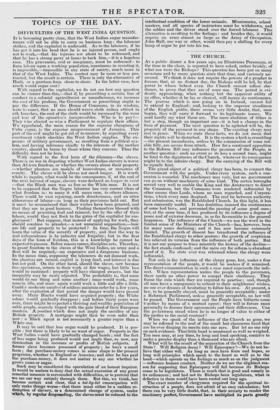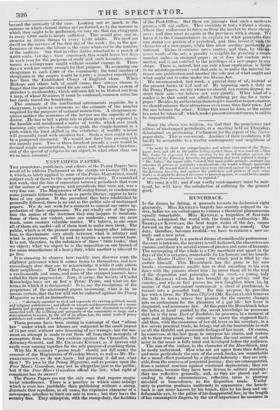THE CHURCH.
AT a public dinner a few years ago, an Illustrious Personage, at the time in the chair, is reported to have asked, rather briskly, of what use were the Bishops? This question has been put on many occasions and by many querists since that time, and variously an- swered. We think it does not require the powers of a prophet to foresee, that, at no distant day, the Bishops will he led, by that Power to whose behest even the Church cannot refuse obe- dience, to prove that they are of some use. The period is evi- dently approaching, when nothing but the apparent utility of an office, whether it be lay or clerical, will insure its continuance. The process which is now going on in Ireland, cannot fail to extend to England ; and, looking to the superior steadiness of the English public, there seems very little doubt, that, once begun, they will carry it forward to its legitimate issues. We need hardly say what these are. The mere abolition of tithes is but a step, though an important one—it is but a change in the form of payment. The next question to be agitated will be, the propriety of the payment in any shape. The existing clergy may rest in peace. When we state these filets, we do not mean that their rights will be disturbed. It is the system which is crumbling —the present incumbents, unless by the commission of some not- able folly, are secure from attack. How far a continued opposition to the Reform Bill may influence the passions of the People, is another question : such an event as its loss a second time, might be fatal to the dignitaries of the Church, whatever its consequence might be to the inferior clergy. But the carrying of the Bill will be equally fatal.
The grand object of a political clergy has been, to connect the Government with the people. Under every system, such a con- nexion is essential. The machinery may vary, but no government can go on without machinery of some kind. The rotten boroughs served very well to enable the King and the Aristocracy to direct the Commons, but the Commons were rendered influential by other means than Lords, whom no man regarded, and Corpora- tions, which every man despised. The real tie between authority and submission, was the Established Church. In this light, it has been eminently useful. It has doubtless insured the continuance of sonic bad laws, and prevented the passing of some good ones; but, at the same time, it has produced by its influence a degree of peace and of exterior decorum, in so far favourable to the general happiness. The influence of the Church—we use the word in the limited sense of the Ministers of the Church—has, however, been for many years declining; and it has now become extremely limited. The growth of dissent has transferred the influence of the Established clergy to other pastors; the growth of scepticism has relieved its votaries from the influence of both parties. But it is not our purpose to trace minutely the history of the decline— the filet stands confessed; and the mere cry for reform is abundant proof of it. No state ever was reformed where the clergy were influential.
Not only is the influence of the clergy gone, but, under a free representation of the people, it would be useless if it remained. The direct communication in such a case must supersede the indi- rect. When representation unites the people to the governors, there needs no other power to compel their obedience. They frame the rule which they are required to practise; and, though all men have a repugnance to submit to their neighbours' wishes, no one ever dreams of hesitating to follow his own. At present, a law, to be generally obeyed, must be generally acceptable : under a Reformed Parliament, unless generally acceptable, no law will be passed. The Government and the People have hitherto •come together by means of a mutual agent; they will in future meet personally to discuss their agreements and their differences. Can the go-between stand when he is no longer of value to either of the parties to the social contract ?
When we speak of the influence of the Church as gone, we may be referred to the zeal of the small but clamorous band that are for ever dinging its merits into our ears. But let no one rely on such evidence. That little band is numbered as well as weighed. • Ten men may, at any time, by long and loud speaking, contrive to make a greater display than a thousand who are silent. What will be the result of the separation of the Church from the State ? Will Religion decay? Will Episcopacy?—We do not be-
lieve that either will. As long as men have fears and hopes, so
long will principles which speak to the heart as well as to the head—which operate on the feelings as much as on the judgment —influence human conduct. Neither do we see the slightest rea- son for supposing that Episcopacy will fail because its Bishops cease to be legislators. There is much that is good and comely in its ordinances ; and had not its Bishops been legislators, what is defective in them would have been rooted out long ago. The exact number of clergymen required for the spiritual in- struction of a people, does not admit of an easy calculation; but
there can be very little doubt, that, in their anxiety to render the machinery perfect, Government have multiplied its parts greatly beyond the necessity d the case. Looking not so much to the manner in which clerical duties are performed, as to the manner in which they ought to be performed, we may say that one clergyman to every 4,000 souls is amply sufficient. This would give one in- structor in divine things to every 1,500 adults. We need not dwell on the services of the first day of the week ; for, in the per- formance of these, the labour is the same whatever be the number of the auditors. Say that in other duties attached to a parish of 4,000 souls, 150 days were consumed, this would leave 163 days in each year for the purposes of study and such harmless amuse- ments as a clergyman might without scandal engage in. Three days a week are surely enough for that purpose. By assigning one clergyman to each 4,000 of the community, the total number of clergymen in the empire would be 6,000; a number considerably less than the Established Clergy of England alone. When Bishops and others talk of small cures, they always choose to forget that the parishes cared for are small. The entire system of parishes is an absurdity, which will soon fall to be blotted out from a map, of whose divisions, it must be confessed, common sense has but rarely traced the boundaries. The estimate of the intellectual attainments requisite for a clergyman, is quite as erroneous as the estimate of' the number required for the purposes of national instruction. A clergyman re- quires neither the acuteness of the lawyer nor the sagacity of the doctor. He has to tell a plain tale to plain people—to expound to the humble and uninformed a series of truths which over much learning only serves to obscure—to guide the simple-hearted in a path which the least skilled in the subtleties of' worldly wisdom will generally tread with steadiest foot. Such a man ought not to be a pampered sinecurist. We would not have him passing rich nor meanly poor. Two or three hundred pounds a year would be deemed ample remuneration, by a pious and laborious Christian; and if the spread of religion be our object, to what other class are we to have recourse ?



























 Previous page
Previous page